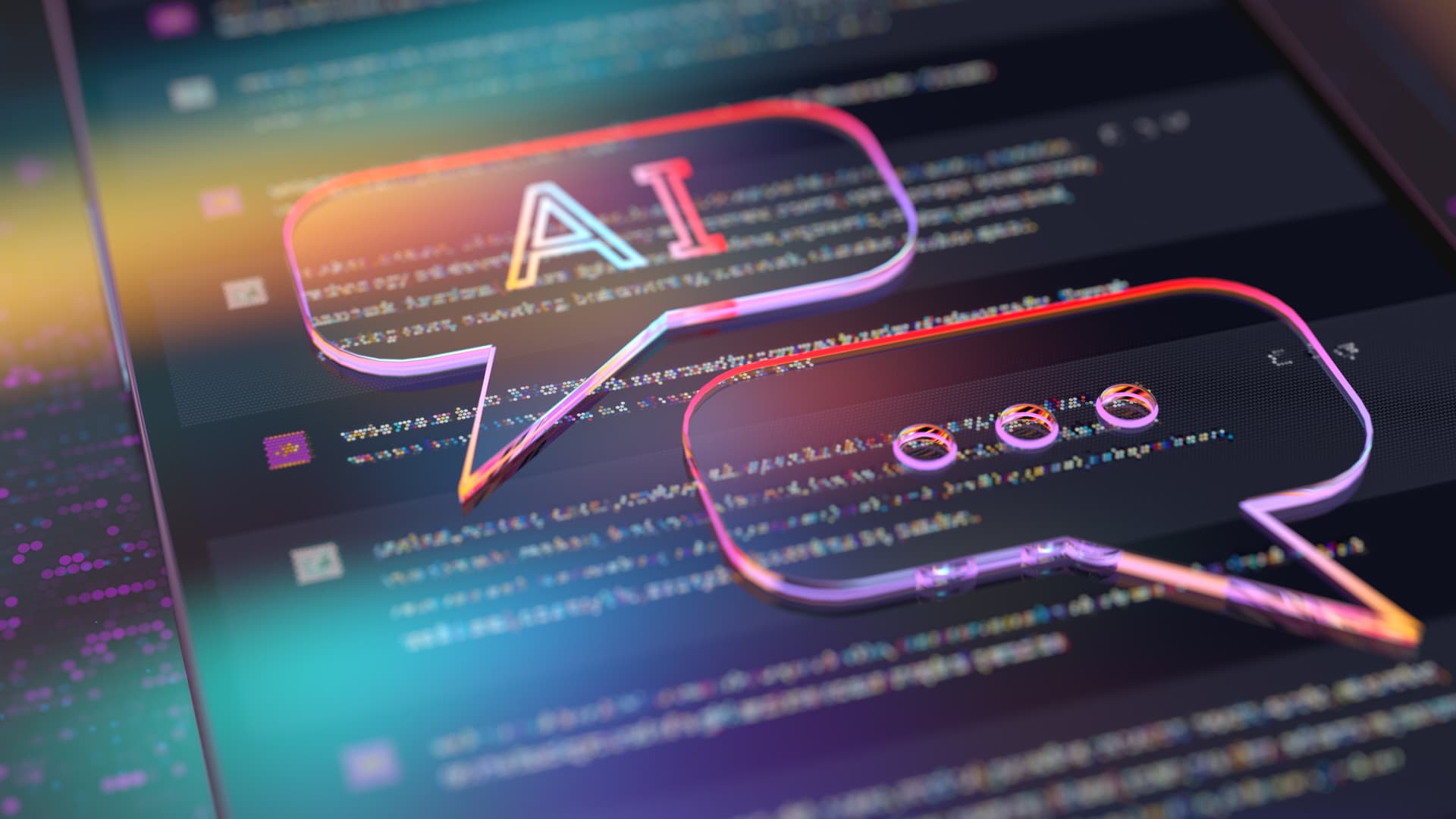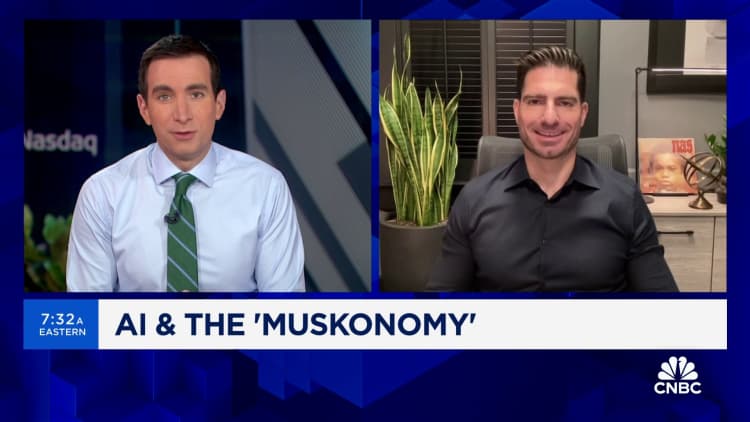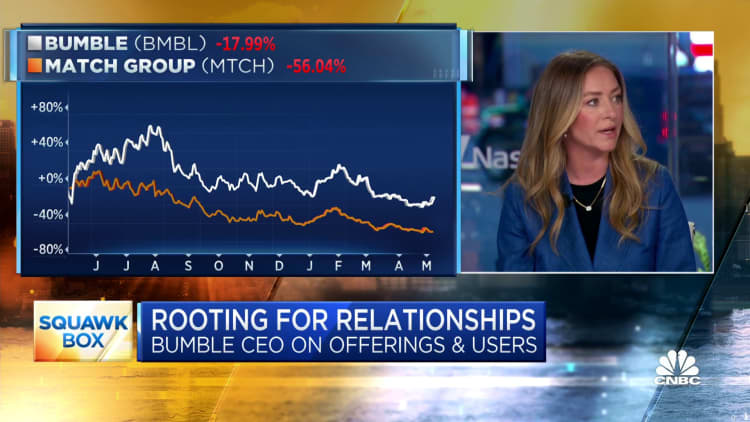
Vertigo3d | E+ | Getty Images
Not so long ago, drafting a text message to your crush may have involved witty cues from a glossy magazine and the input of everyone in your group chat.
As of Valentine’s Day 2024, the world of online romance looks very different. An increasing number of people are using artificial intelligence to flirt, whether that means generating messages for dating apps, uploading profiles, or evaluating compatibility with a “situationship.”
In the U.S., 1 in 3 men ages 18 to 34 use ChatGPT for relationship advice, compared with 14% of women in the same age range, according to a survey last month on AI platform Pollfish. Startups focused on AI-generated messages for dating are seeing booming demand. A Russian man who programmed a chatbot to converse with more than 5,000 women on Tinder is now engaged to one of them.
The phenomenon even found its way last year into an episode of Comedy Central’s “South Park,” when the character Stan Marsh asked another character, Clyde Donovan, for advice on responding to his girlfriend’s texts.
“ChatGPT, dude,” Clyde told Stan, in the school hallway. “There’s a bunch of apps and programs you can subscribe to that use OpenAI to do all your writing for you. People use them to write poems, write job applications. But what they’re really good for is dealing with chicks.”
Some form of generative AI has entered virtually every industry, from financial services to biomedical research. Nvidia, the leading provider of processors used to power most generative AI models, has seen its revenue soar, and its market cap now rivals that of Amazon. OpenAI has emerged as one of the hottest startups on the planet, thanks to its large language models (LLMs), while Anthropic, founded by former OpenAI employees, is trying to catch up.

Generative AI for dating may sound bleak, but it’s not necessarily surprising. Booming interest in the sector has set the stage for a rush of investments and a mountain of new products and services, including some targeting online romance.
YourMove.AI, an AI dating tool that offers a range of services such as drafting messages, analyzing conversations and evaluating users’ dating app profiles, has about 250,000 users, founder Dmitri Mirakyan estimates. Launched in 2022, YourMove receives about 200,000 site visits per month, he said, and revenue has grown roughly 20% month over month.
“The types of people that use this – you’d think it’s mostly just people that feel awkward, but there’s a ton of people who are just introverts,” Mirakyan told CNBC. He said users include people who are shy, speak English as a second language, are navigating cultural change or are simply newbies to online dating.
A ChatGPT user in New York told CNBC that he decided to use OpenAI’s service to draft messages to women on dating apps after the “South Park” episode last March. He would plug in a woman’s opening message to ChatGPT and prompt it to act like a single person with the goal of getting a date. He made sure to tell the chatbot not to ask the person out immediately.
The man, who asked to remain anonymous for privacy reasons, said that texting is the worst part of dating apps. He said he reached the first-date stage with a couple of people using the ChatGPT method and even turned to the chatbot to plan an outing, asking it for date spots in New York.
‘Dating is hard’
Another New York man, who also requested anonymity, told CNBC that he once asked ChatGPT to help him draft a text to a girl he’d been dating and who was about to go on vacation. He wanted to tell her to have fun and not to worry if she couldn’t respond to his messages while she was away. The first versions sounded too contrived, he said, so he had to prompt the chatbot to draft more casual texts.
“Hey [her name], super stoked for your trip!” ChatGPT returned. “Go have a blast and don’t worry about texting back. But hey, if you snag some cool pics or wanna chat, I’m here. Have fun!”
Rizz, an AI dating assistant, debuted in 2022 after ChatGPT took off. Co-founders Roman Khaves and Josh Miller said they had the idea for a personal dating tool years earlier, but to make it work they would have needed to hire dating coaches because the automation technology didn’t exist.
Now, Rizz has 3.5 million downloads to date, with 1 million monthly active users. On average, the number of users increased 30% per month in the last quarter, the company said.
“Dating is hard,” Khaves told CNBC. “It’s become like a second job for many people – people are struggling. There’s a lot of competition out there. Not only do people need to have great photos that stand out, but they also need to know how to start these conversations on dating apps.”
Some startups in the space are currently using OpenAI’s models and customizing them. The companies that spoke with CNBC said they don’t sell or share training data, although they do use it internally to improve the product. They make money from user subscriptions.
Jonathan Raa | Nurphoto | Getty Images
Alex Weitzman went viral on TikTok and Instagram for Texts From My Ex, the AI chatbot she built to analyze her own text conversations from her past relationship. Then she decided to turn it into a website and app called Amori.
Amori uses AI to analyze a user’s entire WhatsApp or iMessage chat history with any person in their contacts list, Weitzman said. The chatbot, which is built atop OpenAI’s models, uses the chat logs to rank the relationship in areas like compatibility, communication, “sexiness” and more, even going so far as to guess each person’s attachment style. (Weitzman and her ex had a compatibility score of just 37%.)
Between TikTok and Instagram Reels, Weitzman’s video has 3 million views so far. Within two weeks of posting it, 30,000 people signed over access to their message histories, she said, and the tool has now been used by 50,000 people. Weitzman went beyond the web to launch a dedicated app in beta this week. Most of her company’s user base has been women, she said.
“There are some things you don’t want to ask your friend,” Weitzman said, adding, “A friend is not going to be able to read thousands of text messages for you. An AI can be so much more specific and find really specific moments in the chat that show evidence.”
Weitzman plans to offer a range of AI dating coaches, each with their own “personality,” as well as different analysis options for text conversation uploads, such as attachment styles, red flag radar and even an “f—boy detector.”
‘Tread with caution’
At YourMove, Mirakyan now has nine part-time employees working on the app. They’ve spent a long time personalizing the AI model and working through problems – making it “flirty but not too flirty,” he said.
In the beginning, Mirakyan recalled, the model would at times seem too aggressive in trying to ask someone out, or generate a message that tried to address everything mentioned in the person’s dating profile. Sometimes it would even make a joke about the person’s proximity (say, two miles away), which came off as creepy.
Mirakyan said there was a “long cycle of both messing with the AI and the inputs that we provide into the AI, but also thinking about, ‘Who does this message appeal to?'”
Like in other areas, relying too much on AI in dating can cross the line into unethical behavior.
Gary Kremen, who founded Match.com three decades ago, told CNBC that “If someone is always tailoring their responses using a chatbot,” that practice “can easily become problematic.”
For example, adding a chihuahua into a photo to try to match with a user who says they love little dogs can be akin to lying about your age, Kremen said. Although the use of AI for dating purposes isn’t necessarily all bad, he added, dating apps will still need to “tread with caution.”

Lisa Marie Bobby, licensed psychologist and marriage and family therapist, told CNBC that while AI can be helpful for first impressions, especially for those who have struggled with online dating in the past, it can also lead to inauthentic connections.
“Maybe they made decisions about getting involved with you based on an experience that they were having with AI-generated communication, rather than actually you,” Bobby said. “In the short term, it can provide this boost. But in the longer term, did you just waste several months of each of your lives?”
AI-powered dating raises a critical question for people to consider, “When you do begin a relationship with somebody, have you presented a version of yourself that isn’t quite who you are?” Bobby said.
Renate Nyborg, former CEO of Tinder, launched Meeno in 2023 as an AI advice tool for any type of relationship, from romance to workplace and everything in between.
Nyborg said that people use Meeno to generate messages or practice conversations with people in their lives, but the app also allows users to look at big-picture trends across their relationships.
Meeno, which commissioned the Pollfish survey that showed the spike in ChatGPT use for relationship advice, is mostly targeted at Gen Z and millennials, for now, and the majority of users are men, Nyborg said. It’s currently available in Finland, Australia and New Zealand, but the company plans to expand to the U.S., U.K. and the Netherlands later this year.
Meeno has been working with a set of beta testers in the U.S. since August, Nyborg said, and they’re among the more than 1,000 people working on the app in total. To date, all of Meeno’s output has been reviewed by human annotators with relevant experience, such as hands-on crisis support or psychology training.
Currently Meeno runs on OpenAI’s GPT-4, among other models, but Nyborg said the company built custom guardrails to provide specialized relationship advice.
The app isn’t “about giving you a fancy chat-up line,” Nyborg said. “Meeno is helping you build actual close relationships.”

